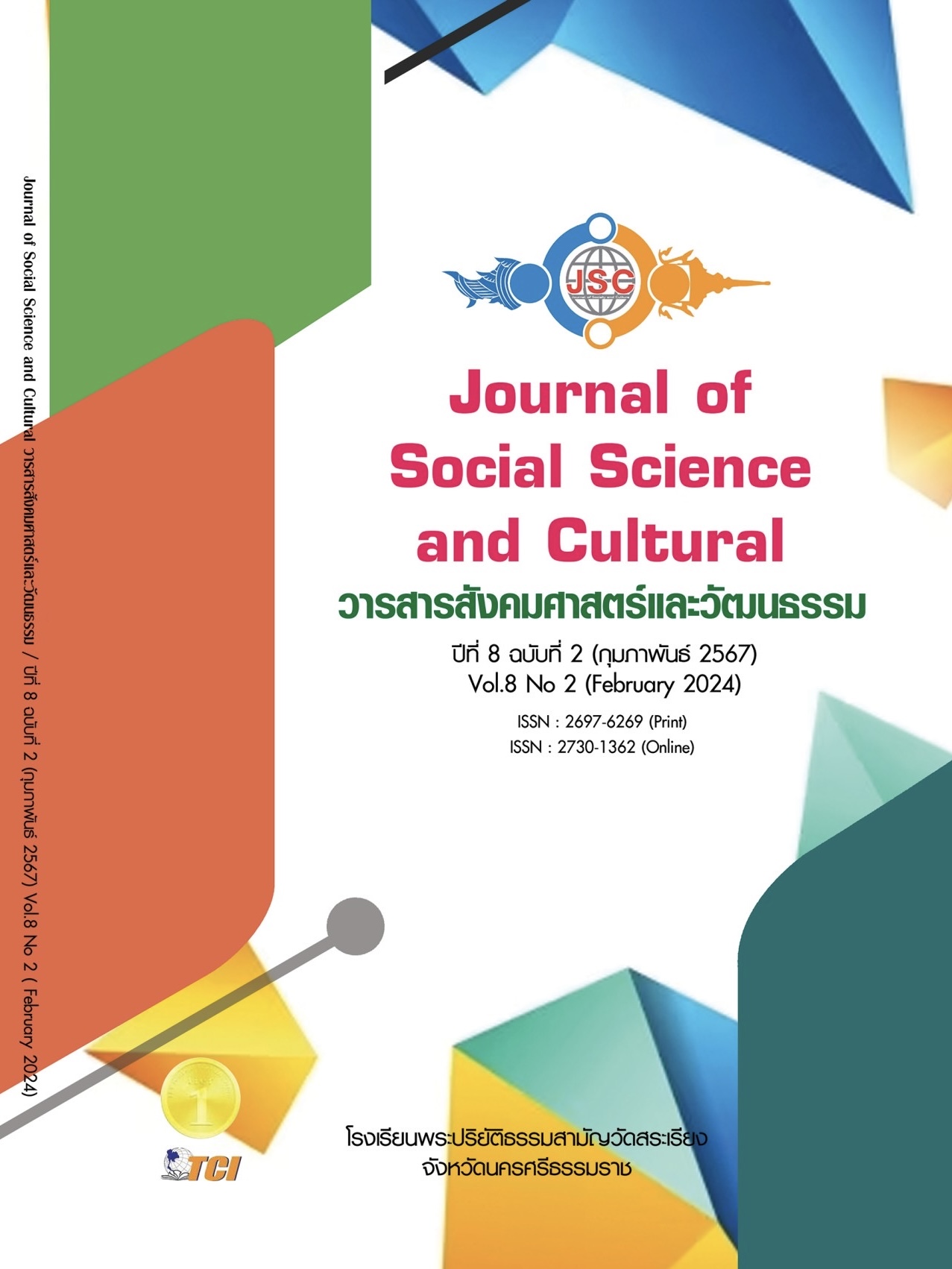SELF-DIRECTED LEARNING IN PERSONAL INDEPENDENCE AND GENUINE UNDERSTANDING
Main Article Content
Abstract
Promoting self-directed learning, a crucial skill for learner development, involves granting learners true freedom in exploring various subjects. This approach prepares them to confidently face diverse challenges as they grow. Self-directed learning is an ongoing educational process that focuses on enhancing learners' capabilities throughout their lives. It fosters a broad learning community, allowing individuals to pursue knowledge, skills, and potentials based on their interests and abilities. By encouraging self-reliance, learners gain control over their life journeys, making more informed decisions and developing resilience to confidently confront challenges. Whether as parents, guardians, or educators, it is essential to introduce and cultivate a sense of independent learning. The causal factors influencing learners' self-reliance can be categorized into two aspects. 1) Situational Factors Affecting Learner Independence: 1.1) Support from family and school 1.2) Positive role models in close proximity 1.3) Influence from online media 1.4) School environment and culture. And 1.5) School management that supports self-reliance. 2) Psychological Traits and Learner Independence: 2.1) Intrinsic motivation and perseverance 2.2) Goal-setting and self-control 2.3) Self-efficacy beliefs 2.4) Attitude towards self-reliance and 2.5) Knowledge and understanding of self-reliance. In conclusion, understanding and promoting self-directed learning require addressing both situational and psychological factors. Emphasizing these aspects helps create an environment conducive to fostering independence, ultimately preparing learners to meet challenges with confidence.
Article Details
References
ฉลาด สมพงษ์. (2562). การเรียนรู้ยุคใหม่. กรุงเทพมหานคร: โอเดียนสโตร์.
ชัยวัฒน์ สุทธิรัตน์. (2552). นวัตกรรมการจัดการเรียนรู้ที่เน้นผู้เรียนเป็นสำคัญ. กรุงเทพมหานคร: แดเน็กซ์ อินเตอร์คอร์ปอเรชั่น.
ทิศนา แขมมณี. (2551). ศาสตร์การสอนองค์ความรู้เพื่อการจัดกระบวนการเรียนรู้ที่มีประสิทธิภาพ. กรุงเทพมหานคร: สำนักพิมพ์จุฬาลงกรณ์มหาวิทยาลัย.
มหาชาติ อินทโชติ. (2557). การพัฒนารูปแบบการเรียนการสอนแบบยูเลิร์นนิงด้วยกระบวนการเรียนรู้แบบโครงงาน เพื่อเสริมสร้างทักษะการสร้างสรรค์ของผู้เรียนในระดับอุดมศึกษา. วารสารวิจัยและพัฒนา วไลยอลงกรณ์ ในพระบรมราชูปถัมภ์ สาขามนุษยศาสตร์และสังคมศาสตร์, 10(1), 15-26.
มัณทรา ธรรมบุศย์. (2544). แนวคิดเกี่ยวกับรูปแบบ / ลีลา การเรียนรู้ (leanings). เรียกใช้เมื่อ 26 มกราคม 2567 จาก https://sites.google.com/a/phusang.ac.th/krukanokwanscience_pwk/how-to-lear/rup-baeb-kar-reiyn-ru
วันวิสาข์ เคน. (2559). การเรียนรู้แห่งศตวรรษที่ 21. กรุงเทพมหานคร: สำนักพิมพ์ Open worlds.
วิจารณ์ พานิช. (2555). วิถีสร้างการเรียนรู้เพื่อศิษย์ในศตวรรษที่ 21. กรุงเทพมหานคร: มูลนิธิสดศรี-สฤษดิ์วงศ์.
เวชฤทธิ์ อังกนะภัทรขจร. (2555). การประยุกต์ใช้ Teach Less, Learn More (TLLM) สู่การจัดการเรียนรู้ในชั้นเรียน. วารสารศึกษาศาสตร์, 23(1), 1-11.
ศักดิ์คเรศ ประกอบผล. (2564). นวัตกรรมและเทคโนโลยีสารสนเทศเพื่อการสื่อสารการศึกษาและการเรียนรู้. กรุงเทพมหานคร: โรงพิมพ์ หจก.วรานนท์ เอ็นเตอร์ไพรส์.
Fleming, N. D. & Mills, C. (1999). VARK a guide to learning styles. Retrieved January 29, 2024, from https://https://vark-learn.com/introduction-to-vark/the-vark-modalities/
Mourned, D. (2009). Project-Based Learning: Using Information Technology. New Delhi: VinodVasishtha for Viva Books l Private limited.


